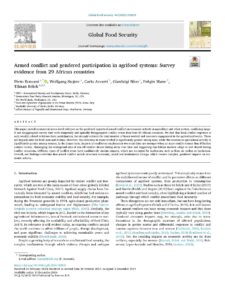Polycrises created by violent conflict and climate change are ubiquitous. Yet, the impacts of conflict and climatic shocks on human behavior and welfare have largely been studied in isolation. This paper studies the joint impact of conflict and climatic shocks on households’ social safety nets in fragile settings. Drawing on unique panel survey data from […]
Read More
An increasing proportion of the world’s poor live in fragile states, and efforts to build economic and social stability increasingly focus on those settings. Fragility harms the political and economic ecosystem, as well as individual endowments. Interventions that only focus on overcoming individual constraints might be insufficient. Support for entrepreneurs to overcome skills or credit […]
Read More
For almost a decade, the UN Secretary-General’s Peacebuilding Fund (PBF), and its implementing partners, have worked in the Polochic Valley in order to address the causes of violence and to reduce its future incidence. In this work, we evaluate the effectiveness of a recent round of interventions, focused on improving the capacities of local dispute […]
Read More
The COVID-19 pandemic caused extensive food insecurity in low-income countries. However, most studies rely on aggregate-level exposure measures, overlooking individual-level heterogeneity and introducing measurement errors that limit causal inference. To overcome these gaps, we examine the impact of COVID-19 exposure on food security in four African countries — Uganda, Tanzania, Sierra Leone, and Mozambique – […]
Read More
Households living in humanitarian settings face extreme vulnerability to adverse shocks. Cash transfers can reduce this vulnerability and enhance household welfare. However, the potential of anticipatory cash transfers – delivered before the adverse impacts of a shock unfold – in safeguarding welfare and fostering social stability remains underexplored. To address this knowledge gap, we study […]
Read More
This study examines the impact of countermeasures, such as stay-at-home orders and school closures, on stress within households during the COVID-19 pandemic. In a phone survey carried out in Uganda, Tanzania, Sierra Leone, and Mozambique throughout 2021 (N = 22,497), 70% of respondents reported the presence of intra-household tension. On average, we document that the […]
Read More
When refugees flee abroad, they carry the legacy of their traumatic experiences across borders. While there are over 43 million refugees worldwide, the long-term effects of conflict exposure on their well-being remain poorly understood. This paper examines how pre-displacement exposure to violent conflict and environmental stressors shapes the long-term social well-being of Syrian refugees in […]
Read More
This paper provides evidence on the impacts of armed conflict and climate change on individual labor intensity. Based on pooled labor force survey, climate, and conflict event data from 21 African countries, we document that climate change and armed conflict can create a polycrisis: the negative impacts of extreme climate events on labor intensity in […]
Read More
When refugees flee violent conflict, they carry the legacies of their experiences across borders. Using representative survey data from refugees living in Jordan, we examine how pre-displacement exposure to violent conflict shapes the long-term social well-being of refugees.
Read More
Social norms are crucial drivers of human behavior. However, misperceptions of others’ opinions may sustain norms and conforming behavior even if a majority opposes the norm. Privately shifting individuals’ beliefs about true societal support may be insufficient to change behavior if others are perceived to continue to hold incorrect beliefs (“lack of mutual knowledge”). We […]
Read More
This paper provides empirical micro-level evidence on the gendered impacts of armed conflict on economic activity in agriculture and other sectors, combining large-N sex-disaggregated survey data with temporally and spatially disaggregated conflict event data from 29 African countries. We find that local conflict exposure is only weakly related to labour-force participation, but strongly reduces the […]
Read More



